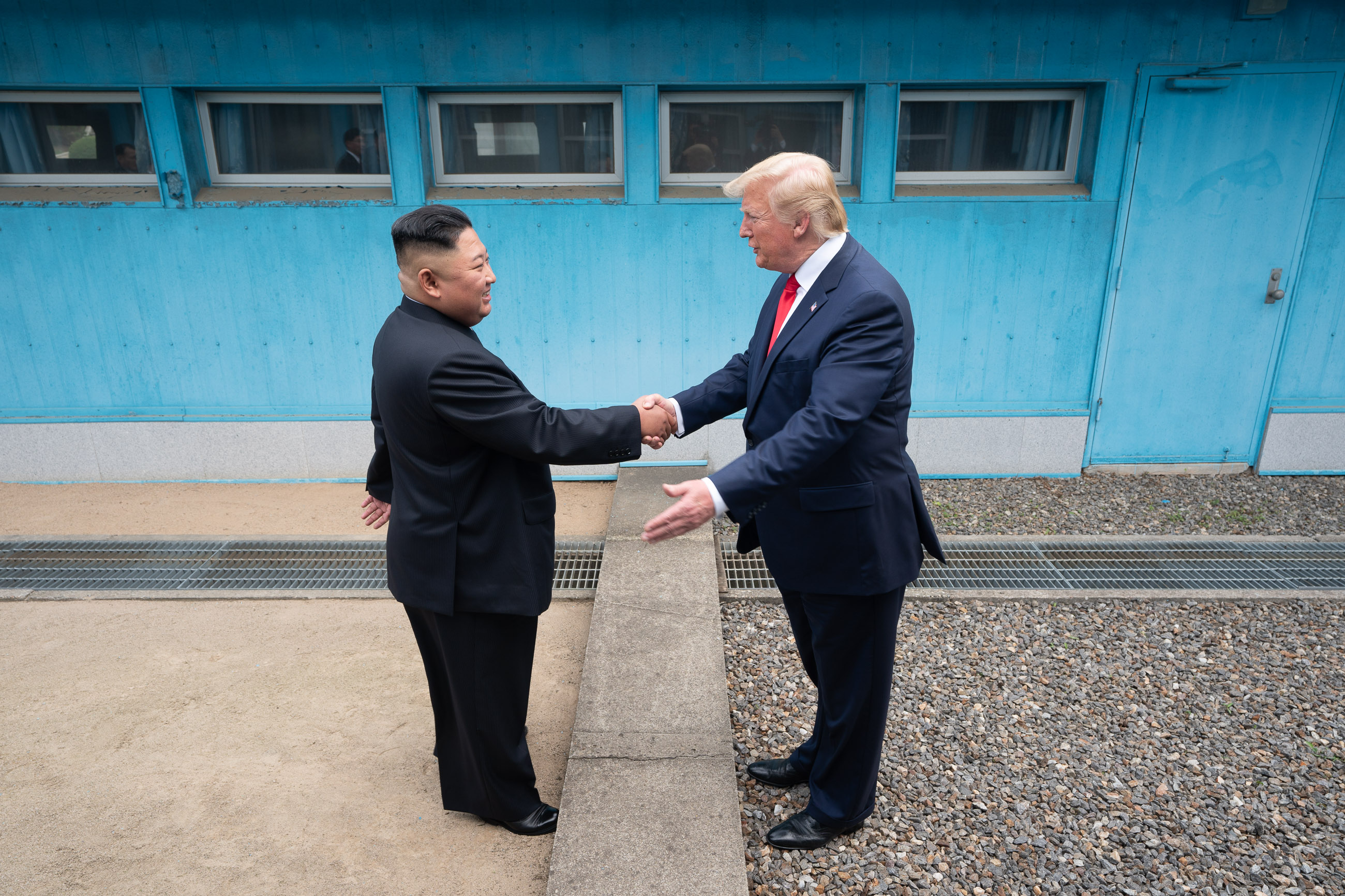
North Korean Leader Kim Jong Un meets U.S. President Trump in the Joint Security Area of the Demilitarized Zone (2019).
“The foreign policy of a state and personal feelings must be strictly distinguished.”
North Korea previewed its negotiating strategy in a hypothetical future Trump Administration via a recent high-level commentary in its main state-run party newspaper. The commentary both dismissed Pyongyang’s interest in negotiating with the United States and refuted former U.S. President Trump’s statement that his personal relationship with Kim Jong Un would make future negotiations easier. North Korea’s Korea Central News Agency (KCNA) on 23 July addressed statements made by former U.S. President Donald Trump in his speech accepting the nomination for president.1 After recounting the litany of grievances the North attaches to the United States, the commentary briefly acknowledges the “special personal relations” between former President Trump and North Korean leader Kim Jong Un before dismissing it with the phrase “we do not care about [Kim Jong Un’s personal relationship or affinity to former President Trump].” The KCNA piece argues that “personal feelings” between leaders and the affairs of state must be separate. The commentary goes on to make veiled threats against the United States and states the U.S. is responsible for correcting the relationship through action.
This commentary offers clues as to how it will approach negotiations with a potential future Trump Administration. A common North Korean negotiating tactic is to portray itself as indifferent to talks and resigned to potential conflict. Pyongyang wants to be seen as “doing you a favor” by agreeing to talk and subsequently rewarded for its magnanimity. This tactic encourages the other party to negotiate with itself over concessions to get North Korea to the bargaining table and keep it there. This tactic is tried-and-true, and the referenced commentary should be interpreted in light of that pattern.
As the U.S. election approaches, North Korea is likely to issue messages from increasingly authoritative sources within the party’s hierarchy, such as Kim Jong Un’s sister Kim Yo Jung or ultimately Kim Jong Un himself. As a rule, the more authoritative the source, the less ambiguity in the North’s course of action and the more likely that the statement represents Pyongyang’s preferences or plans. Although it will be somewhat flexible on the scale, before agreeing to even sit down with the United States, Pyongyang, at minimum, is likely to demand unilateral sanctions relief and cessation of military exercises. North Korea’s ultimate negotiating position is U.S. acceptance of North Korea as a nuclear weapons state toward the ultimate objective of ending Washington’s alliance with South Korea.
Sources:
“조미대결의 초침이 멎는가는 미국의 행동여하에 달려있다 조선중앙통신사 론평 (Whether Second Hand of DPRK-U.S. Confrontation Stops or Not Depends on U.S. Act: KCNA Commentary),” Korea Central News Agency (official North Korean propaganda agency), 23 July 2024. http://kcna.kp/kp/article/q/389b4b6d4d92a66d210125543c87c1d6502d45160a9c295724db5424054b5cfc.kcmsf
Amid the full-dress presidential election race in the U.S., Trump, who has been officially confirmed as a candidate for the Republican Party, said in his speech of acceptance for candidate that “I got along with them and it is nice to get along with someone who has a lot of nuclear weapons and otherwise”, thus buoying a lingering desire for the prospects of the DPRK-U.S. relations. Even if any administration takes office in the U.S., the political climate, which is confused by the infighting of the two parties, does not change and, accordingly, we do not care about this.
It is true that Trump, when he was president, tried to reflect the special personal relations between the heads of states in the relations between states, but he did not bring about any substantial positive change.
He that puts on a public gown must put off a private person. The foreign policy of a state and personal feelings must be strictly distinguished.
For nearly 80 years since the founding of the DPRK, the U.S. has pursued the most vicious and persistent hostile policy toward it.
The DPRK has bolstered up its self-defensive capabilities to safeguard its ideology, social system, dignity and life and is fully ready for all-out confrontation with the U.S.
Due to the serious strategic mistakes of the successive administrations, the era has come when the U.S. should really worry about its security.
Notes:
1 An unsigned KCNA commentary is the lowest level of authoritative statement made in DPRK propaganda. It is designed to show an external audience that North Korea is aware of and discussing a particular issue, but either has not yet decided upon a course of action or is not yet ready to reveal it.
Image Information:
Image: North Korean Leader Kim Jong Un meets U.S. President Trump in the Joint Security Area of the Demilitarized Zone (2019).
Source: https://commons.wikimedia.org/wiki/File:President_Trump_Meets_with_Chairman_Kim_Jong_Un_(48162628746).jpg
Attribution: Executive Office of the President of the United States, Public Domain
